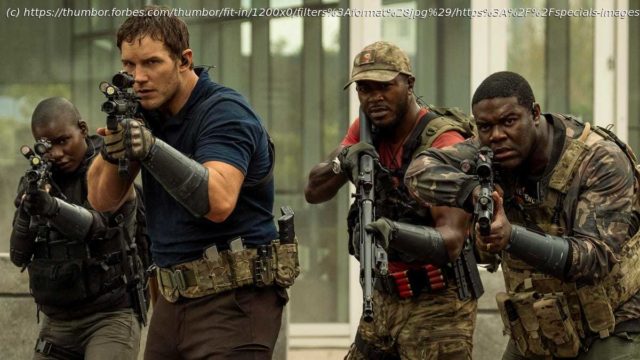Chris Pratt’s time-traveling alien invasion actioner is the best proverbial blockbuster movie of summer 2021 thus far, which makes it a shame that it won’t be in theaters.
The Tomorrow War is just one movie (along with the first Fear Street flick) debuting tomorrow which should have been an old-school Hollywood triumph but will now exist as another notch in the belt of the streaming giants. That Chermin sold the trilogy to Netflix doesn’t make either of them the villain any more than Skydance understandably taking the upfront payday (allegedly around $200 million) for the star-driven, big-budget, star-driven original makes Amazon the baddie. Still, in a cruel bit of irony, director Chris McKay and writer Zach Dean’s sci-fi actioner, starring Chris Pratt as a soldier sent to the future to help humanity fight a losing war against alien invaders, is summer’s best « blockbuster » so far. Since it can’t be seen in theaters, I’d suggest sitting as possible to your HDTV. This explicitly old-school would-be blockbuster wears its 1990’s methodology on its sleeves. It’s a big-hearted and mostly character-focused epic that, like Roland Emmerich and Dean Devlin’s Independence Day, applies the Irvin Allen-era disaster movie formula to the sci-fi action spectacular. Of course, back in 1996, folks would flock in droves to a movie as big and expansive-looking as ID4, and that it wasn’t based on an existing IP wasn’t remotely a hindrance. To be fair, the Fox alien invasion blockbuster cost just $70 million, which was not absurdly expensive in a summer where Twister cost $90 million and Mission: Impossible cost $80 million. I don’t know the production budget for The Tomorrow War, but it certainly looks big in size, scale, scope and copious examples of strong effects work. We live in a world dominated by long-running IP, to the point where new installments take much of their storytelling oomph from retroactively retconning previous installments and undercutting the consequences of their ongoing narrative.
Home
United States
USA — Cinema ‘Tomorrow War’ Review: This Summer’s Best Blockbuster Movie (So Far) Isn’t In...






